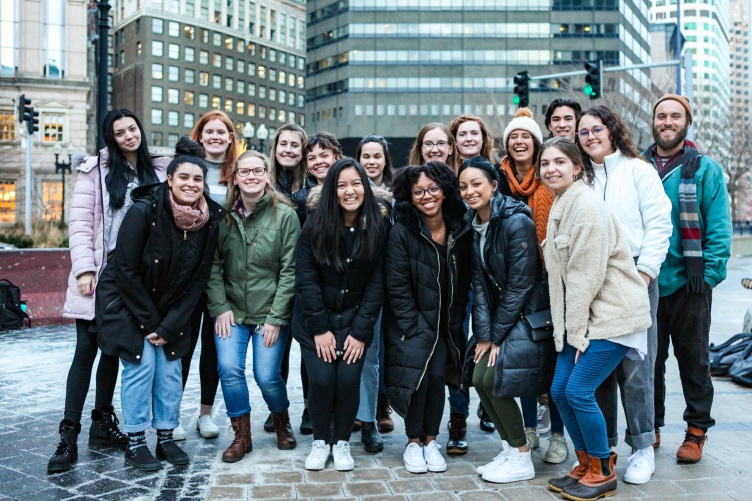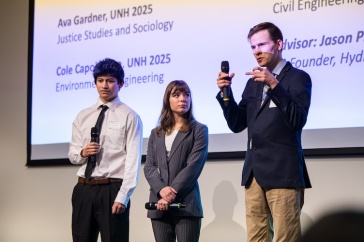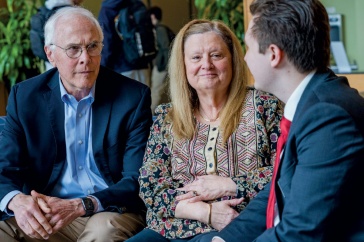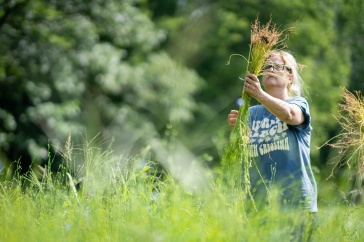
The 2019-2020 changemaker fellows pose for a group photo in Boston.
Often, those seeking broad changes in the way corporations behave toward their employees, society, and the environment, have done so as protestors. Such protests are valuable in raising attention to important issues, but what happens next to create change?
At the University of New Hampshire, tomorrow’s workers are learning that “changemaking” can have a big impact when pursued within an organization. The literal “center” of this pedagogical and experiential movement is the Changemaker Collaborative, formerly known as the Center for Social Innovation and Enterprise.
Founded in 2015 as a joint venture of Paul College of Business and Economics and the Carsey School of Public Policy, the Changemaker Collaborative brings together students, faculty, staff, businesses, non-profits and government agencies committed to advancing positive change for the good of all. The Collaborative supports the next generation of skilled, courageous and confident leaders, through real-world experiences and the tools of public policy and business, while helping community partners advance their sustainability initiatives.
In June 2019, the Changemaker Collaborative brought in the UNH Sustainability Institute as a third partner and now serves more than 1,000 students and alumni a year — many from Paul College.
Fiona Wilson, Director of the UNH Sustainability Institute and affiliate clinical associate professor at the Paul College, and also the Changemaker Collaborative’s co-founder and guiding light, said the program was founded as “a moral obligation” to help students understand that “while there are very real challenges in the world, there are also very exciting potential solutions, and that businesses, because of their scale and innovation capabilities, can, and should, be a major source of these solutions.”
These “very real challenges” comprise the United Nation’s Sustainable Development Goals and they are integral to the Changemaker Collaborative’s own mission. Widely viewed as the blueprint for humanity, and now extensively embraced by business leaders, governments and NGOs around the world, they include ending poverty and hunger, eliminating inequalities, improving human health, addressing climate change and tackling a host of other goals falling under the umbrella of a sustainable society.
Essential experiential education
Like all experiential learning opportunities, Changemaker Collaborative programs allow students to use their education in community-settings, through project-based learning where they can develop the problem-solving, communication and leadership skills even the most interactive of classroom formats can never quite replicate.
Signature programs include the:
-
B-Impact Clinic, which pairs student teams with businesses seeking Certified B-Corporation status. (See “Be the Change.”)
-
NH Social Venture Innovation Challenge, a sustainable, innovative and solution-based idea competition for students;
-
Social Innovation Internship, a summer internship with partner organizations as nearby as Durham and as far away as Tanzania for paid impact-focused projects;
-
Semester in the City, a 16-credit rigorous 30+ hour per week semester-long fellowship with a leading social change organization (nonprofit, business, or public sector) in Boston; and
-
Changemaker Fellowship, a robust set of high-impact and community-based experiences to build a life and a career at the intersection of doing well and doing good.
Nate Richard ’22, a finance and sustainability dual major from Doylestown, Pa., recently spent a semester in Boston as a Semester in the City fellow at the nonprofit Family Aid Boston (FAB), which works directly with families to provide affordable housing to those without a place to live. Richard’s project involved financial and operational analysis aimed at reducing the cost of utilities in the FAB properties.
“My internship gave me a whole new perspective on team building,” Richard said. “I started out thinking I’d go there and focus on finance. I quickly realized that for a project to succeed, you have to bring together all the contributors — in my case, housing staff, case workers and program teams.”

Richard is currently eyeing a career in sustainability consulting for the energy industry. While he plans to focus on for-profits, he appreciates his experience at Family Aid, where he helped secure a $5 million grant from Amazon.
“I had a relatively small part to play, but it’s not bad for a college sophomore,” Richard said.
Experiences like Richard’s enable students to expand their range and depth of competencies, but they also provide timely booster shots of confidence.
“I came to UNH undeclared and had this wild idea that I wanted to double major in anthropology and business. The idea was I’d be able to help people but also get things done,” said Paul College alumna Rachel Vaz ’18, an international business and economics major who was raised in Brazil and moved to Lebanon, N.H. “I gave up both of my aspirations until I got involved with the Collaborative, and then everything began falling into place for me. My passion for social innovation and social justice found a home!”
Through the Collaborative’s Social Sector Franchising Initiative, Vaz spent part of her senior year conducting research on Livelihood Basix, Inc., a social business focused on helping farmers in developing countries based in Tanzania. Then, the summer after graduating, she used a Social Innovation Internship to work at the American lifestyle accessories brand and retailer, Cole Haan. She helped implement software to manage compliance programs for working conditions in Cole Haan’s worldwide network of factories.
The internship helped Vaz see herself in a new light.
“I’d always seen myself as an ‘outsider’ who protested against corporate interests,” she said. “For the first time, I became an ‘insider’ who saw how a for-profit company could leverage its resources to improve the lives of thousands of people.”

After her internship ended, Cole Haan hired Vaz to work full-time in its growing compliance department.
Wilson said that as society puts more pressure on the corporate sector to consider all stakeholders, not just shareholders, and as more companies continue to invest their resources in transforming their business models to allow them to focus on profit and purpose, a complete business education must equip students with the knowledge and know-how to lead them.
“Sustainable business approaches are no longer ‘nice to know,’” Wilson said. “It’s ‘need to know.’ At Paul College we’ve been ahead of the curve in understanding it’s not business or society. It can, and should, be both.”
-
Written By:
Dave Moore | Freelance Writer


















































